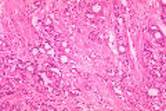Hormone Therapy Shows Little Benefit Against Prostate Cancer
Survival rates no different than 'watchful waiting,' study shows.
By Amanda Gardner
HealthDay Reporter
|
E-mail this article
Subscribe to news
Printer friendly version
|

(SOURCES: Siu-Long Yao, M.D., clinical assistant professor, medicine, Cancer Institute of New Jersey, New Brunswick; Ronald D. Ennis, M.D., director, radiation oncology, St. Luke's Roosevelt Hospital, Continuum Cancer Centers of New York, New York City; Otis Brawley, M.D., chief medical officer, American Cancer Society, Atlanta; July 9, 2008, Journal of the American Medical Association)
TUESDAY, July 8 (HealthDay News) -- An increasingly common therapy used for localized prostate cancer may not bestow any survival benefits on the patient beyond those seen with a simple "wait-and-see" approach.
Men taking androgen deprivation therapy, which shuts off male hormones that can promote tumor growth, even had a slightly lower prostate cancer-specific survival rate.
"This might give pause, and probably should give pause to people thinking about using this approach," said Dr. Robert Ennis, director of radiation oncology at St. Luke's Roosevelt and Continuum Cancer Centers in New York City. "There's always a gray area of patients. This might shift the balance."
But, Ennis added, "this is not an absolute, definitive, end-of-story type study." The research, which is in the July 9 issue of the Journal of the American Medical Association, only looked at whether patients lived or died. There may be other outcomes of this therapy that would make it worthwhile, Ennis said.
And androgen deprivation therapy has been shown to have a benefit in other scenarios, for example, when added to radiation therapy.
"This teaches us something about how we practice medicine, and it does give us reason for pause," said Dr. Otis Brawley, chief medical officer of the American Cancer Society. "A lot of doctors give androgen deprivation therapy without any evidence that it's a good thing for early-stage prostate cancer. One of the reasons we're in such a quagmire on prostate cancer is so many doctors have practiced medicine not supporting the clinical trials but just treating it the way they think they ought to be treating it."
"This is not the first research to show this. There are clinical trials out there that already suggest this is not beneficial, but people have done it anyway," Brawley added. There is also evidence that androgen deprivation therapy can increase the risk of diabetes, stroke and death, among other things. "While it can be useful in a small number, it [can be] quite harmful and should not be used arbitrarily."
Standard treatments for when prostate cancer is still confined to the prostate include surgery, radiation or "waiting and seeing."
"Prostate cancer is not as typical as some of other cancers. It grows at a slower pace, and it tends to occur in men that are elderly, so there a lot of other things going on like heart disease or lung disease or kidney disease or diabetes," explained study senior author Dr. Siu-Long Yao, a clinical assistant professor of medicine at the Cancer Institute of New Jersey in New Brunswick. "If you treat someone for prostate cancer, they could [still] drop dead from a heart attack. The key in this disease where it grows slower is prediction. Who's going to drop dead of a heart attack and who's going to have problems with prostate cancer. It leads to complexity. It's a guessing game more so than in other cancers."
Nowadays, however, more and more men, especially older men, are opting for primary androgen deprivation therapy (PADT) instead of the tried-and-true standards.
"A lot of men think surgery and radiation seem aggressive while observation seems like you're doing nothing," Yao said. "Men and their physicians have started looking for an alternative, which has become hormonal therapy. Use of [PADT] in this setting has grown tremendously in the last decade or two. It is the second most popular treatment [after surgery] but, in spite of that, nobody has really studied whether it works or not."
Yao and his colleagues looked at 19,271 Medicare patients aged 66 and over, none of whom had received "definitive local therapy" such as surgery.
Forty-one percent of the participants had received PADT for an average of 18 months; the rest had simply waited and watched.
There was no increase in 10-year overall survival rates among men taking PADT compared with men undergoing conservative management.
In fact, 19.9 percent of those taking PADT died of their prostate cancer within 10 years, compared with only 17.4 of those on the waiting approach.
A second study, this one presented at the European Society for Medical Oncology Lugano conference, found that the number of prostate tumor cells circulating in a patient's bloodstream can predict how effective the treatment is. On average, the fewer the circulating tumor cells, said researchers from the Royal Marsden NHS Foundation Trust in the United Kingdom, the longer the survival.
More information
Visit the National Cancer Institute for more on prostate cancer.
Copyright © 2008 ScoutNews, LLC. All rights reserved. 
HealthDayNews articles are derived from various sources and do not reflect federal policy. healthfinder.gov does not endorse opinions, products, or services that may appear in news stories. For more information on health topics in the news, visit the healthfinder.gov health library.